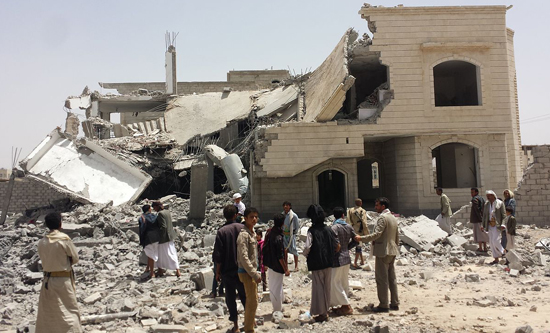
Saudi-led airstrikes continues to visit death and destruction on the people of western Yemen with British and US support. Figures revealed on 16 September by the Yemen Data Project showed that one in three airstrikes carried out by the Saudi-led coalition have hit civilian targets. The UN estimates the death toll as more than 10,000, with almost 40% civilians. Despite this, British weapons sales to Saudi Arabia continue. The importance of Britain’s alliance with Saudi Arabia is made consistently clear by British government efforts to block arms embargos or full investigations into the war.
Britain is the world’s second largest arms exporter. British arms sales to Saudi Arabia in the 18 months since the war on Yemen began currently stand at £3.3bn. These sales sustain jobs and factories in some parts of Britain, at the expense of endless lives in Yemen. In addition, Campaign Against the Arms Trade has revealed that around 250 British MOD civil servants and military personnel work to support these contracts – funded by Saudi Arabia. As British bombs continue to be sold to Saudi Arabia, raining down in turn on Yemen, wrangling in parliament over the sales grinds on. Two of the parliamentary Committees on Arms Export Controls have called for an immediate ban on arms exports to Saudi Arabia for use in Yemen and another has supported calls for a UN investigation. However, Foreign Secretary Boris Johnson blocked calls for a ban or independent investigation, explaining that there was no evidence that Saudi Arabia was ‘in clear breach’ of humanitarian law, and that Saudi Arabia has ‘the best insight into their own procedures and will be able to conduct the most thorough and conclusive investigations.’ In late September, Britain also blocked an attempt led by the Netherlands to launch an EU inquiry into civilian deaths in Yemen.
In his speech to the Labour Party conference, leader Jeremy Corbyn pledged to end British arms sales to Saudi Arabia. Focus on Britain’s role in the war on Yemen is clearly increasing. It is essential that anti-imperialists seize this moment in a way which can start to build effective opposition against the murderous role of British imperialism in Yemen and elsewhere.
Toby Harbertson




